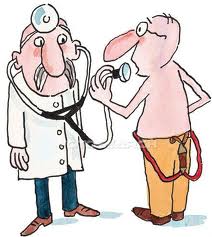A recent qualitative study (structured interviews) of patients conducted at McGill University School of Medicine underscores the importance of listening in physician-patient interactions. In this study, patients were asked to identify the qualities of a good physician. The following is a typical patient response:
“A good physician is somebody who will listen to what the problem is and explain to you what it is and what is being done.’’
 When people were asked why listening by the physician was so important, researchers discovered three important themes that have apply to every provider today.
When people were asked why listening by the physician was so important, researchers discovered three important themes that have apply to every provider today.
Theme #1 – Respondents (people/patients) believed that listening was essential if the physician was to arrive at the right (and credible) diagnosis.
Representative Comments:
- ‘Physicians “should trust the person in front of them and hear what they’re saying. . .because I know my body better than anybody else.“
- ‘‘Listen to what they [patients] have to say; not just what other people wrote about them in the doctor’s notes.
- ‘‘[If] I feel that I haven’t had enough time with you to tell you exactly what my story is, even when you give me a prescription I’m going to say, ‘Really? Is this prescription right for me and for my illness? Or [is it] going to give me more complications?’. . .and I think sometimes that’s why you find patients will take it for 1–2 days and after that they forget about it, because they say, ‘He didn’t hear what I had to say about this pain.
Theme #2 – Listening is healing and therapeutic.
For years researchers have written about the therapeutic value of strong physician-patient communications. Turns out patients recognize the same benefits. For example, a physician who listens and “validates the patient’s perspective or expresses empathy may help a patient experience improved psychological well-being—fewer negative emotions (e.g., fear, anxiety) and more positive ones (e.g., hope, optimism, and self-worth) ”
Representative Comments:
- ‘‘If a doctor doesn’t respect the patient, or doesn’t listen, the patient feels more worried and unsettled and this has an impact on their health.’’
- ‘‘Sometimes, listening to a person will cure half of your problem. . . like it takes two or three months to get an appointment. In those two–three months, you make your problem worse by thinking, ‘Oh maybe it is this, or that or that or that.’
- ‘‘if you listen to the patient and give the patient respect, what you are actually doing is helping that person take responsibility for their own health – that they are also in control of the healing process and are involved somehow. So the doctor has to not take all the power away from the patient.’’
Theme #3 – Listening can foster and strengthen the doctor–patient relationship if it is authentic
Representative Comments:
- ‘‘I want the doctor. . . to have empathy and to listen and to look into my eyes and to make me feel that for that short moment…you are hearing me, you are there for me, and you give me that sense that I matter
- ‘‘It still makes me angry when I think about how I was. . .how I sort of felt ridiculed for my looking into alternative options.’’
- I think they [physicians] should listen out of respect. Sometimes I think that caring and compassion can be patronizing, if it is insincere. You can still be arrogant and project this caring and compassionate facade.
Take Aways
Over all I was struck by the following as I read this study…particularly the respondent comments.
- People/patients in the study clearly recognized the link between effective listening (by providers) and quality of care. Too often providers are quick to discount the accuracy or validity of patient perceptions of quality whether in the hospital or doctor’s office. The comments reflected in this study suggest otherwise.
- Listen skills are essential to patient engagement and positive patient experiences. To be engaging, providers must be “relevant” from the patient’s perspective. To be relevant, providers must solicit and listen to what patients want to tell them.
- If listening is therapeutic and has the power to heal…does this mean that physicians who 1) do not solicit or 2) ignore or gloss over patient input are not practicing at the “standard of care?” Given that poor physician-patient communications is a leading cause of malpractice suits it would seem so.
- Health care providers (physicians and hospitals) would do well routinely do a “deep dive” into their patient satisfaction research to get a true and realistic handle on the quality of their provider’s listening and other communication skills. I am not sure that the standard HCAPS and CHAPS survey instruments probe physician-patient communications far enough.
That’s what I think. What’s your opinion?
Source:
R. L. Street et al. How does communication heal? Pathways linking clinician-patient communication to health outcomes. Patient Education and Counseling, 2009. 74(3), 295-301.
J. Jagosh et al. Patient Education and Counseling. 85 (2011) 369–374

No question that listening makes or breaks the health care provider-patient relationship. But, few providers are taught how they listen or how to recognize the listening styles of their patients. Listening is not a “one-size-fits-all” skill; it is highly individualized, habituated in our brains, bodies and emotions, and very complex. I write a weekly blog on listening and there are several posts on this important topic. listeningimpact.com/blog
Pingback: Dr. Eleanor Barbera | My Better Nursing Home